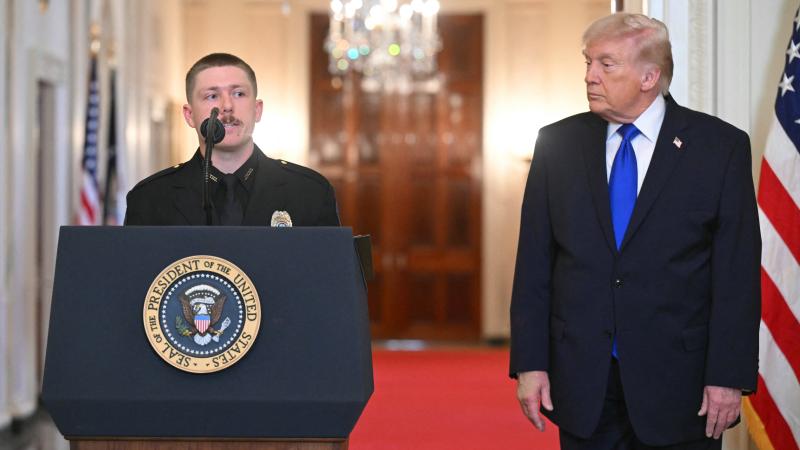A study in Supreme Court confirmation contrasts: Ketanji Brown Jackson vs. Brett Kavanaugh
Jackson supporters "pretending" that "serious questions and discussion on the relevant qualifications of a judge" are "somehow equivalent to what happened in the Brett Kavanaugh process," says legal activist Carrie Severino.
While conservatives noted the civility shown Judge Ketanji Brown Jackson during the Senate confirmation hearings as compared to those of Justices Brett Kavanaugh and Amy Coney Barrett, liberals complained that the Supreme Court nominee was asked difficult questions.
Jackson, President Joe Biden's first nominee to the high court, has a history of progressive views and judicial philosophy, such as praising "the godfather of Critical Race Theory" and reducing prison time for a child pornography offender. In contrast, former President Donald Trump's last two Supreme Court nominees, Kavanaugh and Barrett, are both conservative Catholics with pro-life views regarding abortion.
"The View" host Sara Haines on Wednesday criticized Republican senators for asking Jackson about her faith while claiming that it had been necessary for senators to ask Barrett about her religion during her confirmation hearing.
"The difference was it made sense for Amy Coney Barrett to be questioned on those things purely because one of the number one issues dividing this country is a woman's right to choose versus pro-life, and it's a religious — it's greatly and mostly based in a religious belief and separating that belief out," Haines said.
Barret's "whole life was enmeshed in religion," Haines continued. "It was beyond just she goes to church on Sunday. She was on boards, she was on pro-life boards. So when they pressed her on religion — whereas Lindsey Graham had kind of couched it in, 'They're trolling all this personal information' — it absolutely was necessary in the questioning of Amy Coney Barrett, whereas, when they did it to Ketanji Brown, they're trolling her, they're trying to make her out to be something."
Haines said that senators will not vote on Jackson based on the hearings, but rather party lines. Sens. Ted Cruz (R-Texas), Josh Hawley (R-Mo.), and Lindsey Graham (R-S.C.) were "campaigning for presidency," she claimed, and "trying to ride on her coattails already, whereas she's barely able to answer these questions — 'Are babies racist? Rate your religion on a scale of one to ten. What's the definition of a woman?' It speaks to how unassailable she is that it's reached this absurd level of questioning."
Cruz had asked Jackson if babies are racist in reference to the book "Antiracist Baby" because the private school she serves as a board member teaches it to students in pre-K through second grade.
"I do not believe that any child should be made to feel as though they are racist or though they are not valued or though they are less-than — that they are victims, that they are oppressors," Jackson replied. "I don't believe in any of that."
Sen. Marsha Blackburn (R-Tenn.) queried Jackson on the definition of a woman with regard to transgender issues.
"Can I provide a definition? No, I can't," Jackson said, later noting that she is "not a biologist."
Government professor Nadia Brown, chair of the women's and gender studies program at Georgetown University, told the Los Angeles Times that she had her class watch clips of Jackson's confirmation hearing and explained the "attacks" she endured from the senators.
"This is just a master class in how Black women have to be patient — have to be fully composed in responding to things that are meant for destruction," Brown said. "These are the kinds of attacks that Black women get in their professional roles."
On the other hand, previous Republican SCOTUS nominees endured tough questioning and "smear campaigns," Carrie Severino, president of Judicial Crisis Network, told "Just the News, Not Noise" cohosts John Solomon and Amanda Head Wednesday, the final day of the Jackson confirmation hearings.
"I'm grateful that Republicans have never, and I think — I hope — never will give a nominee the treatment that Brett Kavanaugh endured," Severino said. "This is not ever going to be a circus with smear campaigns, etc."
Democrats are "already going wild over simply asking Judge Jackson difficult questions," Severino noted. "You know, Senator Durbin apologized this morning for all that this process has put you and your family through and the bizarre conspiracy theory claims — and I'm going, 'Wait a minute, what bizarre theories?' No one's claimed that she raped someone on a boat in Rhode Island, that she, you know, like that she was a serial rapist ..." (Severino was alluding to uncorroborated allegations pushed by Democrats during the Kavanaugh confirmation process that the nominee had committed a sexual assault while in high school.)
"We're talking about people who are actually investigating her record in nine years on the federal bench," she said of Republicans. "Those are legitimate questions, and even when she's been asked legitimate questions about actual areas of law — which, I will remind you all, Justices Gorsuch, Justice Kavanaugh, Justice Barrett, but also people like Justice Kagan and Justice Sotomayor, were willing to answer — you can discuss these areas of law and she has dodged all of those questions.
"So we didn't see handmaids and we didn't see protesters today, and I'm very grateful of that. But we're seeing people trying to turn serious questions and discussion on the relevant qualifications of a judge into — and pretending that that's somehow equivalent to what happened in the Brett Kavanaugh process. And I think anyone could go back and relook at those hearings, and then be reminded of the distinction."
During the opening session of Jackson's confirmation hearings on Monday, Blackburn, Graham, and Sen. Chuck Grassley (R-Iowa) all emphasized that the process would be respectful and civil, unlike the Kavanaugh and Barrett hearings.
Blackburn pointed out that Barrett was "questioned about her faith and whether that made her suitable for the court."
She also said that GOP Judiciary Committee members would "focus on the issues that the American people want to focus on because they want to know about you, and how you're going to approach your job, and the decisions that you have made in the past; what you've written, what you've said."
At the end of the Monday hearing, Senate Judiciary Chairman Dick Durbin thanked "all participants and members of our audience for keeping this dignified, respectful and civilized."
















